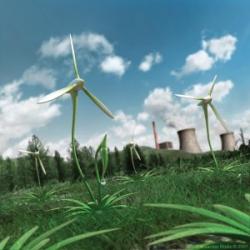Vietnam Willing To Go Green

According to a recent study, Vietnam has one of the highest willingness rates to go green. According to Grant Thornton, the auditing and consulting firm who conducted the study, Vietnam has a 68% willingness rate to endure the short-term sacrifice that may come about by focusing on renewable energies.
A business report from the same company also stated that despite the intense demonstrations and protests against the Arab countries since last December, Brent Crude increased to a high $125 per barrel in April. This is a significant increase to the beginning of last year’s $85 per barrel and today remains above $110. Because of this, Southeast Asian governments gave full support to researches on finding alternative fuels and took specific actions to protect current resources.
Vietnam itself has a good potential for renewable energy because it is a windy country that has more than 3,200 km. of coastline and between 2,000-2,500 hours of sunshine annually. Because of this, many businesses (51%) stated they are willing to take the short-term risk of paying higher energy costs in exchange for reducing the economy’s dependence on oil and gaining more stable prices in the long term.
Philippines has the highest willingness rate on this endeavor at 82%. Vietnam comes in second with its 68%. 60% of businesses in North America support the renewable energies movement while the G7 nations has a 53% willingness rate. Surprisingly, and perhaps disappointingly, the BRIC economies composed of Brazil, Russia, India and China only support this mission at a low 35%. Among the ASEAN respondents, Philippines and Vietnam have the highest rates, while Thailand, Malaysia, China and South Korea have been developing renewable energy as a part of their national policy for years.
The increase among Vietnamese firms to support renewable energy and the protests in the Arab countries and North Africa are hoped to urge the government to take specific action to build on its existing plans on the matter, maintain and develop its implementation, and coordinate with its fellow ASEAN members to ensure the success of this mission.
The unrest in the two specified countries have a global impact on oil prices. Saudi Arabia in particular holds more than half of oil reserves all over the world, and so the demonstrations have particularly affected the prices to soar significantly. On the brighter side, this event has triggered businesses to find more renewable and sustainable sources of energy as an alternative.
In retrospect, the unrest in the Arab countries and North Africa has created a global impact especially in the oil prices all over the world. OPEC nations are continually at loggerheads on the increasing demand of oil supply, prompting the International Energy Agency to release over 60 million barrels of oil from the emergency stock. This issue brings up the critical and sad fact that economies all over the world have a heavy reliance on oil from other sources, and this needs to be addressed urgently. On the more positive side, this critical issue has taught international firms to explore and utilize renewable and more sustainable sources of energy for a more positive long-term effects.









